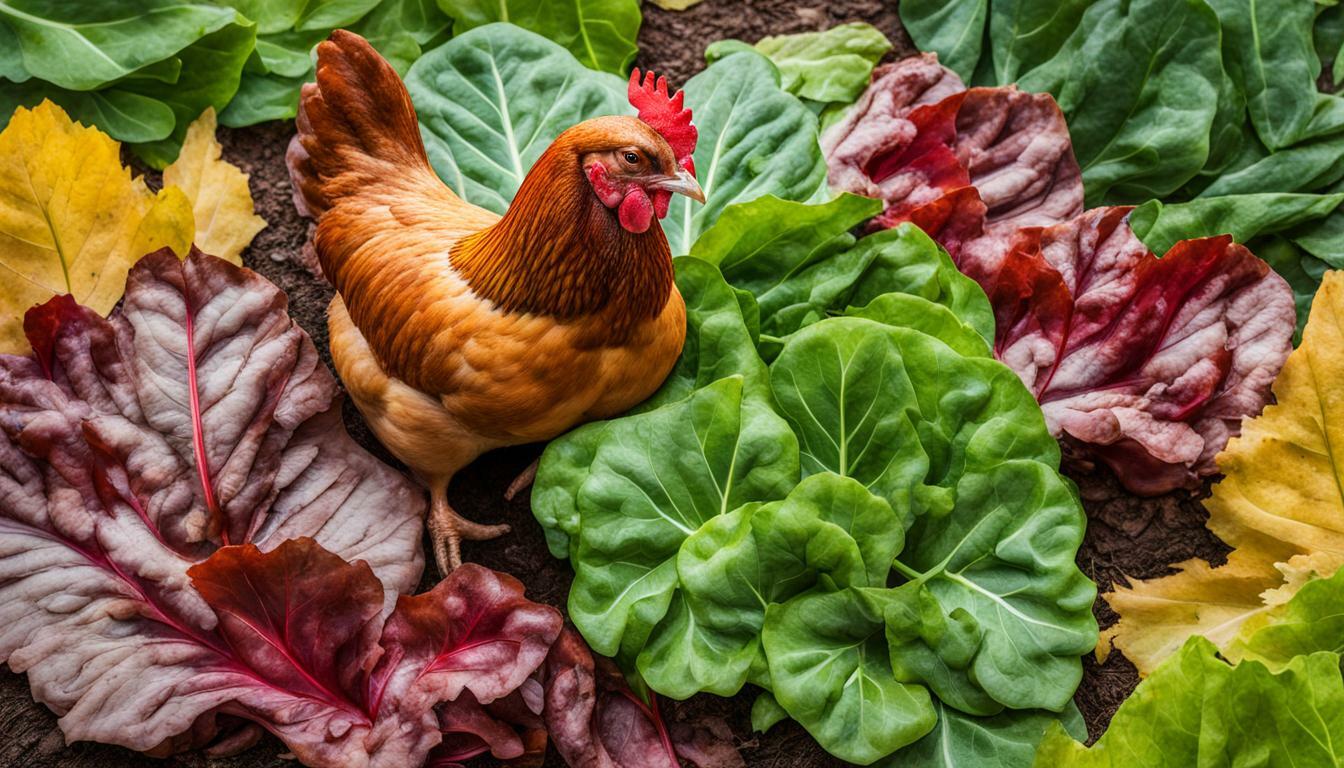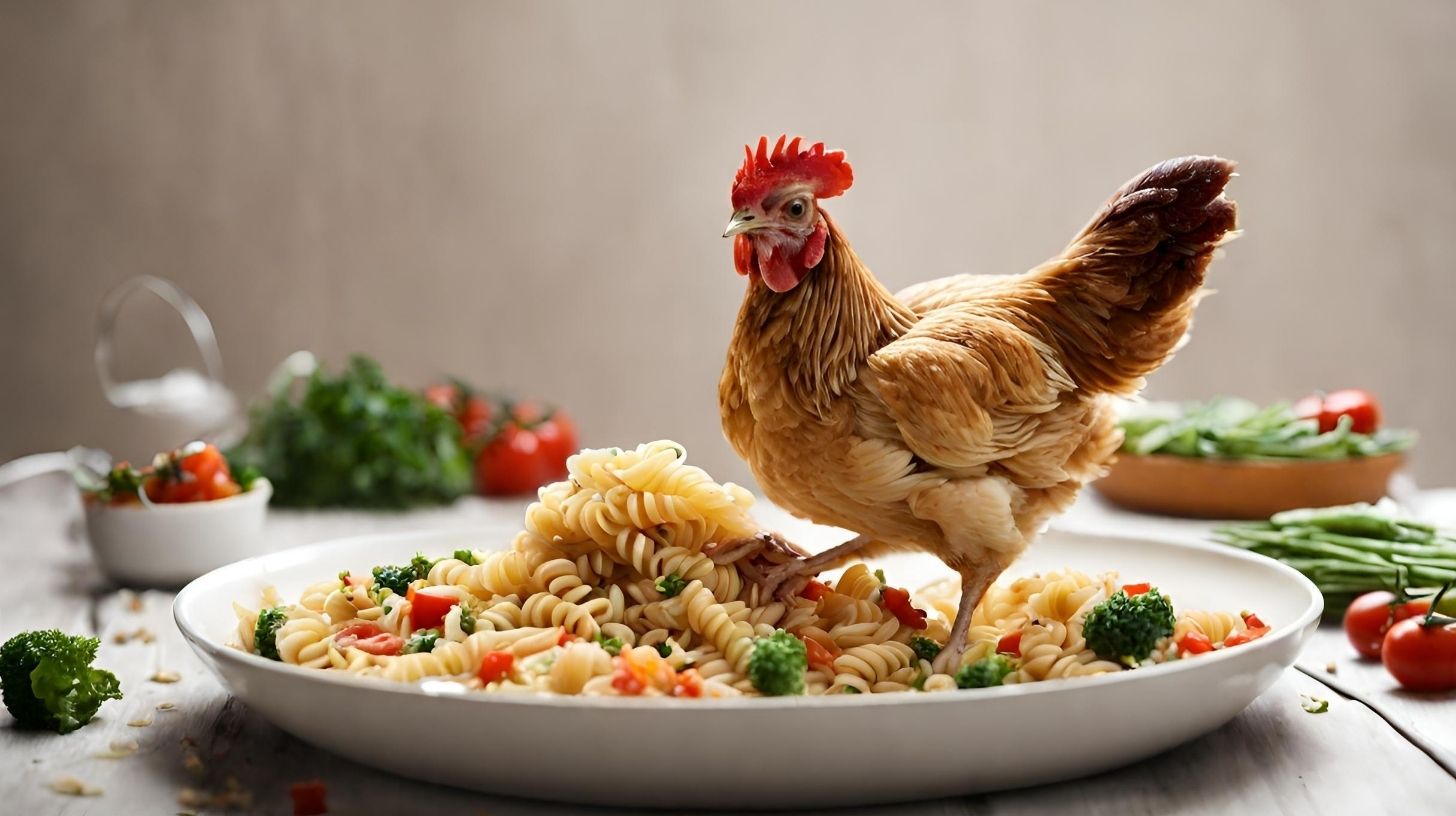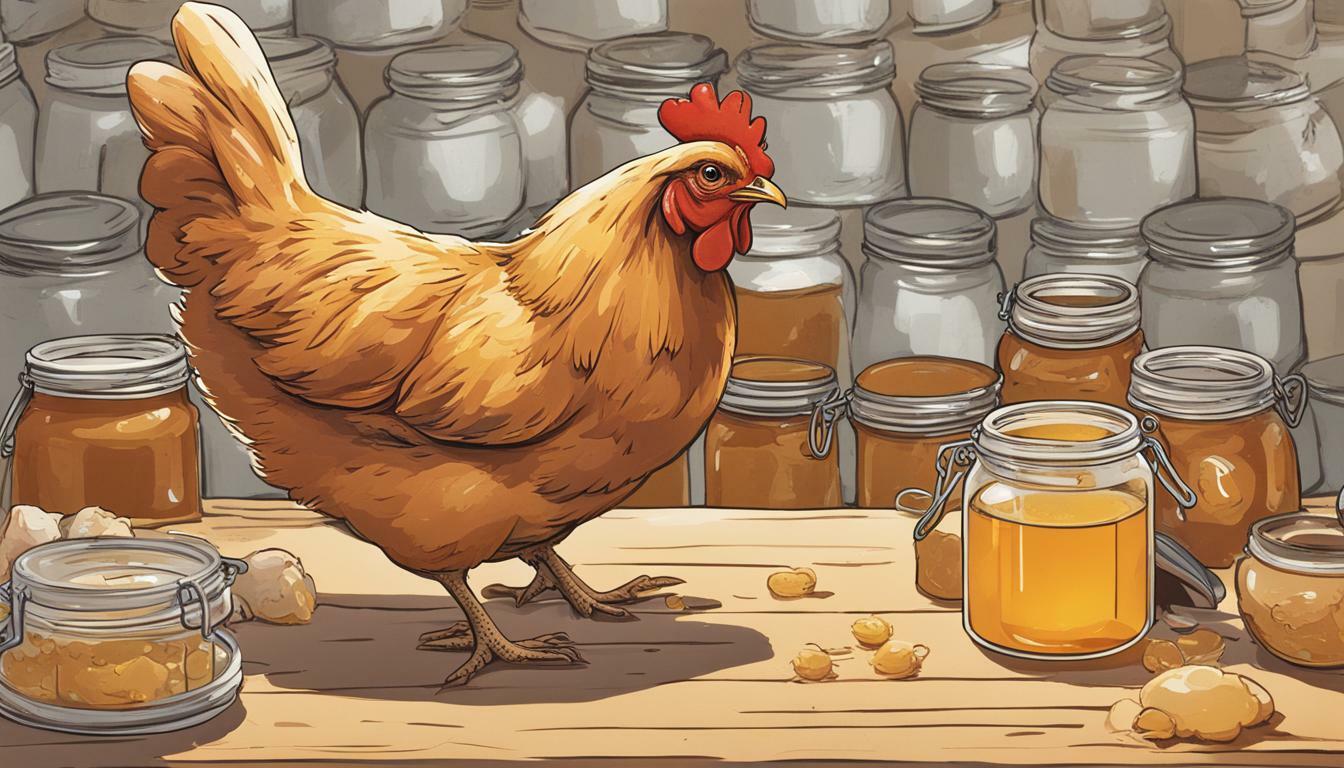Can Chickens Eat Swiss Chard? Discover Nutritional Benefits

Table of content:
- Can Chickens Eat Swiss Chard Leaves?
- Are Swiss Chard Greens Safe For Chickens?
- What Are The Benefits Of Feeding Chickens Swiss Chard?
- Will Swiss Chard Hurt Chickens?
- Is Swiss Chard Bad For Chickens?
- How Much Swiss Chard Can I Feed My Chickens?
- Should I Chop Up Swiss Chard For Chickens?
- Do Chickens Like The Taste Of Swiss Chard?
- Can I Feed Chickens Raw Swiss Chard?
- Can Baby Chicks Eat Swiss Chard?
- Final Thoughts
Swiss chard is a leafy green vegetable that is packed with nutrients. Many backyard chicken keepers wonder if they can feed swiss chard to their flock. In this article, we’ll take an in-depth look at whether chickens can eat swiss chard, including the potential benefits and downsides.
Can Chickens Eat Swiss Chard Leaves?
The simple answer is yes, chickens can safely eat swiss chard leaves in moderation. Both the leaves and stems of swiss chard are edible for chickens.
Swiss chard is a member of the beet family and has dark, leafy greens. It is a good source of vitamins A, K, C, E, and several B vitamins. It also contains minerals like magnesium, potassium, iron, and manganese.
Chickens are omnivores, so they enjoy eating both plant and animal matter. Leafy greens like swiss chard provide important vitamins, minerals, and antioxidants as part of a balanced diet.
The leafy greens contain beta-carotene, which is converted to vitamin A. Vitamin A is essential for egg yolk color. Greens also provide lutein, which is great for chicken eye health.
Are Swiss Chard Greens Safe For Chickens?
Swiss chard is considered a safe, healthy treat for chickens in moderation. It does not contain any toxic compounds that could harm chickens.
However, swiss chard contains oxalic acid and oxalates which can bind to calcium and potentially cause nutritional deficiencies if fed excessively. Oxalates may also irritate the throat or crop if large quantities are eaten.
As long as swiss chard is fed in moderation as part of a balanced diet, it is safe for backyard chickens. Make sure plenty of calcium-rich foods are also included in their diet to counteract the oxalates.
What Are The Benefits Of Feeding Chickens Swiss Chard?
There are several benefits to feeding swiss chard to your flock:
- Nutrition: Swiss chard provides protein, vitamins A, C, K, E, and B vitamins, magnesium, potassium, iron, calcium, and antioxidants. These nutrients support immune function and overall health in chickens.
- Eye health: The lutein and zeaxanthin in swiss chard greens are beneficial for chicken eye health and vision.
- Skin and feathers: The beta-carotene in swiss chard converts to vitamin A to promote healthy skin, feathers, and egg yolk color.
- Egg nutrition: Nutrients from swiss chard get deposited into eggs, increasing the nutritional value of eggs for human consumption.
- Variety: Swiss chard adds variety to your chickens’ diet which keeps them interested in eating.
- Local and sustainable: Swiss chard can easily be grown in home gardens or bought locally to provide a fresh, sustainable supplement for backyard chickens.
Will Swiss Chard Hurt Chickens?
When fed properly, swiss chard is completely safe for chickens. It does not contain toxic compounds or substances that can harm chickens.
As mentioned, the main concern is overfeeding swiss chard, which could cause an imbalance of nutrients due to the oxalic acid binding with calcium. Eating extremely large amounts could potentially irritate the crop.
To avoid issues, swiss chard should be fed in moderation – no more than 1-2 times per week as a supplemental treat. Make sure a calcium source is provided in their main feed ration.
Do not suddenly introduce large amounts of swiss chard. Start with small amounts so their digestive system can adjust. Overall, swiss chard is a healthy addition to the diet if chickens are fed in appropriate quantities.
Is Swiss Chard Bad For Chickens?
Swiss chard is not intrinsically bad for chickens. When fed properly in moderation, swiss chard provides beneficial nutrients.
However, swiss chard should not make up the bulk of a chicken’s diet. It does not provide complete nutrition on its own. Excessive amounts could lead to potential nutritional imbalances.
Chickens with kidney issues may also have a harder time processing oxalates, so check with your vet before feeding. Otherwise, the majority of chickens can enjoy swiss chard as an occasional supplement without issues.
Rotten, moldy, or wilted swiss chard should be avoided as it could cause illness. Always provide fresh greens. With proper feeding techniques, swiss chard can be a healthy addition to the flock’s menu.
How Much Swiss Chard Can I Feed My Chickens?
When feeding swiss chard to chickens, moderation is key. Swiss chard should be no more than 1-2% of their total feed ration.
For most standard-sized chickens, you can feed approximately:
- 1⁄4 to 1⁄2 cup chopped swiss chard per chicken, 1-2 times per week
- Up to 1 cup for larger chicken breeds, 1-2 times per week
Adjust quantities based on the size of your birds and how readily they eat the greens. Start slowly with small amounts and increase gradually.
The leafy greens can be provided as a snack or incorporated into a vegetable chop or salad mix along with other fruits and veggies to balance the oxalate content.
Avoid feeding swiss chard daily or in excess. The bulk of their diet should still come from a complete layer of broiler feed.
Should I Chop Up Swiss Chard For Chickens?
It is usually best to chop swiss chard leaves and stems into smaller pieces before feeding to chickens. You can use a knife or kitchen shears to cut up the greens.
Chopping swiss chard makes it easier for the chickens to consume. They do not have teeth to chew up large, whole leaves. Cut greens also allow better access to the nutrients.
Smaller pieces are also safer as large leaves may get stuck and cause a choking hazard. Chopped greens are easier for chicks and young chickens to swallow.
Aim for chopping swiss chard down into strips 1 inch or smaller. The stems can be slightly larger pieces than the leaves. Cutting the greens will allow your flock to safely enjoy the nutritional benefits.
Do Chickens Like The Taste Of Swiss Chard?
Most chickens seem to enjoy eating swiss chard, especially when chopped into bite-sized pieces for easy consumption.
Chickens naturally forage and peck at greens, seeds, and insects. The leafy texture and vegetable taste of swiss chard appeals to their natural tastes.
You may notice preferences between individual chickens. Some will eagerly devour greens, while others are more hesitant. Offering greens free-choice in a garden can help all birds get comfortable with new flavors.
If your flock turns up their beaks at swiss chard at first, try mixing small amounts with their regular feed to encourage tastings. They will usually acquire a taste over time. Persistence pays off in switching up their diet!
Can I Feed Chickens Raw Swiss Chard?
Swiss chard can safely be fed raw to backyard chickens. Washing the greens before feeding is recommended.
Cooking swiss chard is not necessary and could actually diminish some of the vitamin content, particularly vitamin C and B vitamins which are sensitive to heat.
Feeding greens raw provides enzymes and natural nutrients. It also introduces beneficial bacteria into the chicken’s digestive tract to support gut health.
Raw leafy greens like swiss chard most closely mimics your flock’s natural diet. Just be sure to chop the leaves and stems to an appropriate size before serving.
Can Baby Chicks Eat Swiss Chard?
Swiss chard can be fed to chicks once they are 2-3 weeks old as their digestive system matures. Introduce small amounts at first.
Chicks should still be eating a high-quality starter feed as their main diet. Clean, fresh water should also be available at all times.
Chop the swiss chard leaves and stems into tiny, chick-sized pieces. Offer just a few bites per chick at first. Gradually increase serving size as they get accustomed to greens.
Avoid feeding swiss chard to newly hatched chicks under 2 weeks old. Wait until their digestive tract can handle vegetables before introducing leafy greens.
Getting chicks used to greens like swiss chard early will increase acceptance as they grow into adulthood. Just be sure not to overfeed at any age.
Final Thoughts
In summary, swiss chard is a beneficial supplemental food for backyard chickens when fed properly in moderation. The leafy green is packed with nutrients like vitamins A, C, K, lutein, manganese, potassium, and antioxidants.
Feed 1-2 times per week, no more than 1/2 cup per standard chicken. Chop leaves and stems into bite-sized pieces for safety. Provide less for bantams and chicks. Mix with their regular feed to encourage consumption.
Avoid overfeeding swiss chard since it contains oxalic acid. Make sure their overall diet includes a source of calcium. With proper feeding techniques, swiss chard can provide valuable nutrition to keep your chickens happy and healthy.
Welcome. I’m Adreena Shanum, the proud owner of this website, and I am incredibly passionate about animals, especially poultry. I founded adreenapets.com as a labor of love, stemming from my desire to share my knowledge and experiences with poultry enthusiasts worldwide.




